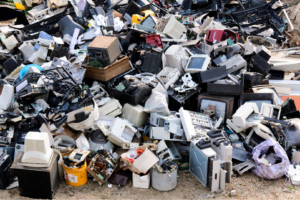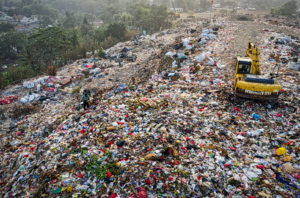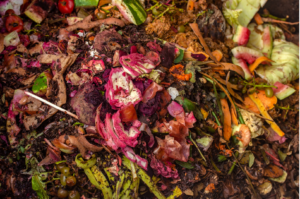Waste Management Challenges and Opportunities in Africa
As Africa continues to experience rapid economic growth, urbanization, and industrialization, waste management has become a pressing issue with significant environmental and health impacts.
The lack of proper infrastructure and legislation to manage industrial, electronic, and municipal waste is leading to the contamination of land and water sources, posing a threat to human and animal populations and natural ecosystems.

To understand waste management opportunities and challenges in Africa, Captain Forest interviewed Piotr Barczak, Advisor at the International Council for Circular Economy; Founding Member of #Circularity4All)
Q: Can you share important waste management figures in Africa?
After a decade of professional experience within the European Union (European Environmental Bureau), I can say that obtaining precise waste management statistics in Europe can be challenging and even more difficult in Africa, where there is a lack of consistent data collection systems for different workstreams.
In 2012, for an estimated population of 1,1 billion people, 125 million tonnes of municipal solid waste were generated in Africa. UNEP expected this volume to double by 2025 to achieve about 250 million tonnes of municipal waste in Africa (1).
By comparison, in Europe, 225 million tonnes of municipal waste were generated in 2019 for a total population of 446,8 million (2).
According to UNEP estimates, almost 60% of Municipal Solid Waste (MSW) in Africa is organic (1). The high proportion of this waste stream presents a distinct advantage, as its separation from the other waste at the source would significantly contribute to positive outcomes.
Despite the challenge of accessing waste management data in Africa, it should not be regarded as an insurmountable barrier. Instead, we can proactively take steps to obtain relevant information through a concerted effort.
Q: Can you tell us the main categories of waste in Africa?
Classification of waste is generally complex. Here are the categories usually used for solid waste:
Municipal solid waste in Africa
Municipal solid waste category encompasses waste produced by city residents, typically including organic waste and packaging materials.
In Africa, this waste category poses two challenges:
- The absence of Extended User Responsibility (EPR – see explanation below)
- And the lack of separate waste collection.
Consequently, achieving circularity is complex, and recycling occurs on a limited scale.
Hazardous waste (mainly industrial) and electronic waste in Africa
In Africa, hazardous waste encompasses various waste streams, including mining, industries, medical facilities, construction and demolition activities, automotive, and others.
Unfortunately, the lack of regulations in many African countries means that hazardous substances are often released into the environment without any accountability from the responsible companies.
In Africa, there are two issues related to electronic waste: domestically generated and illegally imported electronic waste.
The volume of domestically generated electronic waste is on the rise in Africa.

However, importing electronic waste is illegal, yet it still occurs. For instance, there was a recent case of electronic waste exportation from the Canary Islands to Senegal(3), despite the Basel Convention banning waste imports from Northern to Southern countries.
Agricultural waste in Africa
African countries must implement appropriate management practices for agricultural waste in rural areas to avoid improper disposal methods such as dumping or burning.
Q: You mentioned that countries illegally export electronic waste from Europe to Africa. What can we do to ban these types of practices?
The illegal import of hazardous waste from the Global North to the Global South is a significant concern, despite the Basel Convention‘s ban on such shipments. Criminal organizations often facilitate such illegal imports.
Besides, while the export of second-hand goods, including electronics, from the North to the South is legal, it poses problems as these goods should ideally be reused in the country where they were initially used to benefit the local community.
One issue is that Extended Producer Responsibility (EPR) fees collected in Northern countries when these products were first put on the market do not follow in Southern countries when these products are exported as second-hand goods.
Additionally, large part of the second-hand goods exported to Africa are not reusable and are, therefore, waste.
This situation is unfair to Africans as they receive waste, lack the necessary recycling facilities to manage it, and do not receive the required funds to develop these facilities.
The EPR fees remain in the North, sequestered into EPR schemes there, and unavailable to Southern countries to manage the end-of-life of imported second-hand goods.
Q: The lack of legislation and enforcement to control industrial waste in many African countries is a significant challenge, leading to widespread pollution and environmental degradation. Which regulations could protect Africa from industrial waste pollution?
Implementing legislation similar to European laws, such as the Industrial Emissions Directive (IED) and Extended Producer Responsibility (EPR), would greatly benefit Africa by protecting it from the adverse effects of industrial waste.
The IED is a European law that sets rules for controlling certain industrial activities’ emissions and other environmental impacts, including air, water, and soil pollution.
Industrial operators must utilize the best available techniques to reduce emissions and other environmental impacts.
EPR is a policy approach in which producers are responsible for managing the entire lifecycle of their products, including end-of-life management, recycling, or safe disposal.
By imposing EPR fees on the whole lifecycle of polluting industries in Africa, countries could ensure that producers pay for the environmental footprint of their products, forcing them to adapt their operations to reduce fees.
Q: Can you explain the causes of municipal waste mismanagement in African urban areas?
The rapid urbanization and demographic growth in Africa, coupled with the lack of waste management infrastructure and legislation, are the primary causes of municipal waste mismanagement on the continent.

With thirteen out of the twenty largest cities in the world expected to be in Africa by 2050, the pressure on waste management might increase significantly.
While the informal sector has been relied upon to manage waste, it will likely need help handling the anticipated waste volumes and their heterogeneity.
Therefore, African countries need to develop proper waste management infrastructure and regulations, including policies such as EPR, to address the waste management challenges they face.
Besides, Although the lack of education is often cited as a primary cause of waste mismanagement in Africa, this explanation overlooks the significant role that the absence of proper regulations and infrastructure plays in the problem.
Thus, attributing the issue solely to a lack of education fails to address Africa’s complex waste management challenges fully.
Q: What are the most advanced countries in Africa for circular economy policies?
Rwanda is a prime example of a country that has successfully implemented circular economy principles through the enforcement of laws, resulting in a clean capital city, Kigali.
Other countries, including Ghana, Tunisia, Senegal, Cote d’Ivoire, South Africa, Mauritius, and Nigeria, have also developed their National Circular Economy strategies.
With the African Development Bank’s support, we expect more countries to follow suit and begin developing their circular economy strategies.
Q: What can African countries do to improve their municipal waste management?
African countries can take an essential step towards effective waste management by implementing separate organic waste collection at the source.

As organic waste can constitute up to 60% of the total waste generated, separating it would address a significant part of the problem.
Organic waste management is also the most feasible stream, requiring low-technology, low-energy, and low-skill infrastructure. It is possible to use both centralized and decentralized composting units.
This reduces the need for transportation, and the compost produced can be used locally as a fertilizer to enhance soil health.
Separating organic waste from other waste streams, such as plastic, metal, glass, or paper, makes it much easier to treat and recycle these materials.
Moreover, African countries can utilize the EPR policy to finance the necessary infrastructure for recycling electronics, plastics, paper, metal, and glass rather than relying solely on international aid for funding.
Q: What is the role of African governments and other stakeholders, such as private companies and international organizations, in addressing the African waste management issues?
African countries must implement regulations downstream, for waste management and upstream, for product design and import.
Waste management is at the end of the pipeline. Still, it is crucial to have eco-design policies and restrictions on imported products to address the root cause of waste generation.
Without addressing the design of products and restrictions on imports, waste management alone will not solve the waste problem in Africa.
Q: What are the significant obstacles to investment in African waste management?
Typically, people attribute the challenges in waste management in Africa to armed conflicts, uncertainty, regulation, or education.
However, I disagree with the latter, as a lack of education is not the main barrier. As mentioned, we cannot blame the African people for inadequate infrastructure and regulations.
While some investments have been made in waste management in Africa, the primary hurdle is the unsuitable nature of these investments or poor advice from experts. For instance, investments in incinerators are a wrong approach.
Q: How does proper waste management contribute to the local economy in Africa?
Proper waste management contributes to a cleaner and healthier environment and creates safer job opportunities. By separating waste at the household level, waste workers will benefit from safer working conditions.
Moreover, waste management goes beyond just recycling and collection. It also offers opportunities for repair and reuse, which can create meaningful employment prospects for Africans.
Composting can also benefit rural communities by promoting collaboration between cities and farmers. This approach generates value for farmers while simultaneously improving soil health.
Q: Any word of hope?
Properly sorting and collecting organic waste can significantly improve the recycling rates in Africa, in a short time. Moreover, an increasing number of African governments acknowledge the importance of circular economy policies and are taking steps to establish a comprehensive policy framework, including national circular economy roadmaps.
This approach fosters stakeholder dialogue and helps drive progress toward a sustainable future. More countries need to recognize the significance of circular economy principles and policies as they are crucial for the environment, the economy, and public health.
Sources:
- (1) https://wedocs.unep.org/bitstream/handle/20.500.11822/25515/Africa_WMO_Summary.pdf?sequence=1&isAllowed=y
- (2) https://ec.europa.eu/eurostat/web/products-eurostat-news/-/ddn-20210216-1#:~:text=Almost%20225%20million%20tonnes%20of,EU%20Member%20States%20in%202019.
- (3) https://www.africanews.com/2023/01/04/spain-dismantles-criminal-network-smuggling-electronic-waste-to-west-africa/
Read further
To learn what are the waste management challenges in Indonesia, click here.




